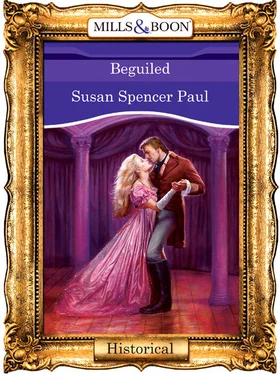Cardemore gave a grunt of amusement. “You’ll not be bothered again, I give you my word. Little though you may credit it, my word is as reliable as death.” His attention still given to his papers, which he was neatly piling into different stacks, he added tersely, as though Graydon were an aggravating and misbehaving servant, “I offered you a chair.”
With an effort, Graydon didn’t react with so much as a raised eyebrow. “You may take your chair, my lord, and go to Hell. If you wish to speak with me, then I advise you to speak. Otherwise, I’ll not keep Lady Lillian and Lady Isabel waiting.”
With an abrupt movement, Cardemore sat back and regarded his guest. “It isn’t so much what I might say to you, Graydon,” he stated with cool intent, “but rather that I believe you have something you wish to say to me.”
The muscles in Graydon’s jaw tightened painfully, and for a moment his anger was so white-hot that he thought he would say something truly unwise. But he remembered himself, and remembered the sort of man Cardemore was—one not to be dealt with lightly, or, worse, foolishly.
“If you received the message I gave your minion, then you already know my sentiments. I should be curious to know, however, why you neglected to tell me that Lady Lillian cannot speak, and why you seemed to find such information irrelevant.”
A look of irritation crossed Cardemore’s scarred features, and he replied, gruffly, “Lily can speak. She chooses not to do so for reasons of her own. As you say, I find the fact irrelevant, both in regard to Lily and in regard to your seeing to it that she enjoys her time in London. However you may view the situation, whether Lily speaks or does not speak has no bearing on the task set before you.”
“So you say,” Graydon replied. “Because of your lack of care, I very nearly humiliated her. At Almack’s. Even you, with your disdain of the accepted social customs, must realize what that would have meant to her.”
“It would have been unfortunate,” Cardemore admitted, “especially for your mother and sisters. You may think me an unconscionable swine for subjecting Lily to such a chancy situation, but I felt assured of your response. You and your kind are too well-bred to so readily fall on your faces. You’d shatter before you’d crack. Isn’t that so, Graydon?”
“You,” Graydon said quietly, “take much for granted.”
“Aye,” Cardemore concurred with a thin smile. “There is often little other choice for a man in my circumstances, which is why planning for any eventuality is so needful. If you had, by chance, brought Lily sorrow, you would know by now how unfortunate a mistake it was.”
“Your threats, sir, grow wearisome. I find it difficult to believe that Lady Lillian is in any way related to you.”
At this, Cardemore uttered a laugh. “I find it the same, and ever have. Lily’s a beauty, isn’t she? Charming, wellmannered and thoroughly delightful. She’s so unlike the rest of my family that I’m often tempted to believe the fairies left her, rather than that my father, especially, had any part of her. But that is neither here nor there.” He waved one hand outward. “You want to know why Lily doesn’t speak, is that not so?”
“It would be helpful.”
Cardemore gave him a measured look before saying, “She was born in a perfectly normal state, despite the fact that the birth was complicated and my mother died a few hours later. She was an extraordinarily quiet baby, seldom crying, which evidently led my thick-skulled fool of a father to believe that she was somehow mentally deficient. I suppose if she had squalled night and day as my brother and I probably did, he would have assumed she was perfectly hale. As you have seen for yourself, she is.”
Graydon inclined his head.
“When Lily was three years of age, so some of the older servants tell me, she had only just begun to speak, later than most children, perhaps—” he gave an indolent shrug “—but not so extraordinarily late as to give proof to my father’s belief in Lily’s mental failings. She was, these same servants insist, a bright and clearly intelligent child. If allowed to progress in her own manner, I have no doubt that even my stubborn father would have at last admitted his mistake. But it was around this time, shortly after Lily’s third birthday, that one of the serving maids lost her own young child, an unfortunate event that subsequently caused her to madden. For some reason, she decided that Lily would be better off dead, and to that end she mixed lye into the milk in Lily’s silver cup and served it to her with her dinner in the nursery.”
“God in heaven,” Graydon murmured, horrified.
“Indeed. She nearly died from ingesting the poison, most of which, fortunately, she spat out, else she never would have survived. A long illness and high fever followed. To my father’s credit, Lily was surrounded by the finest doctors and given every care. To his discredit, he refused to believe these same doctors when they insisted, after Lily recovered, that her sudden inability to speak or even utter a sound was due to the inflammation that had severely scarred her vocal cords. He was convinced that she was an idiot, just as he had been convinced of it before, and as she could no longer even make a human sound, he refused to have anything more to do with her. She was given over to the care of the servants, who learned to keep her out of my father’s and brother’s way, and had not, until I inherited the title, even been given the benefit of a tutor. Lily could not read or write a word until she was twelve years old. She couldn’t speak a word until two years later, when she was fourteen.”
“But she can speak?” Graydon pressed.
“She can, although it is painful for her to do so, and she grows weary after a brief effort. Also, it is very…difficult. Lily dislikes the sound of her voice. The scarring makes it impossible for her to achieve anything remotely feminine, although, for my part, I find her speech delightful. Still, she prefers the sign language.”
“The sign language,” Graydon repeated more thoughtfully. “This morning, in the park, she and your niece, Lady Isabel, were communicating in such a way, with their hands.”
“It is the same method that is taught in France at the Royal Institute for Deaf-Mutes, by Abbé Sicard, of whom I am sure you’ve heard tell. One of Sicard’s most ardent disciples, Mr. Charles Cassin, has established a school here in England using these very methods, modified, of course, to English. Before doing so, however, he lived at Cardemore Hall for five years, serving as Lily’s tutor, also as mine and the rest of my household’s. Every one of us, including the servants, learned the sign language for Lily’s benefit.”
His words presented Graydon with a baffling picture of the Earl of Cardemore, very different from the one he presently held. The man must care for his sister if he went to so much difficulty, going so far as to require even his servants to learn a language that they would most likely only ever use with Lady Lillian. He realized, suddenly, why she had been so confident in coming to London. Cardemore, for all his wickedness, had given her that.
“But there are other methods of training deaf-mutes, are there not?” Graydon asked. “Better methods? The French sign language has not been widely used here.”
“Not here in England, no, although it has been widely accepted in other parts of the world. Here the oral method is the approved manner of dealing with deaf-mutes, although it seems to be a method better suited to those who can hear and speak than it is for the deaf-mutes. We tried that with Lily, at first, but since she is not entirely deaf, she can hear the sound of her own voice and, as I have said, dislikes it. Eventually she became so unhappy that my sister-in-law, Lady Margaret, insisted that we find an alternative. Charles Cassin came to us after that, and the change in Lily was both rapid and remarkable. She’s made up for a good deal of lost time with Mr. Cassin’s help.”
Читать дальше












